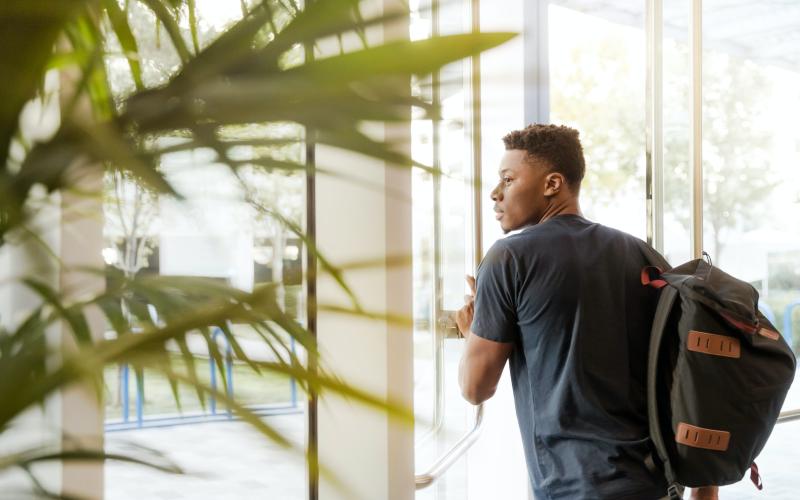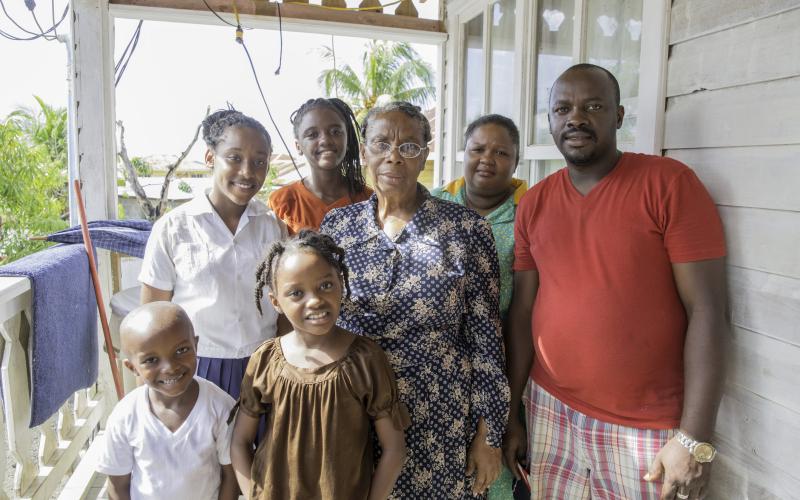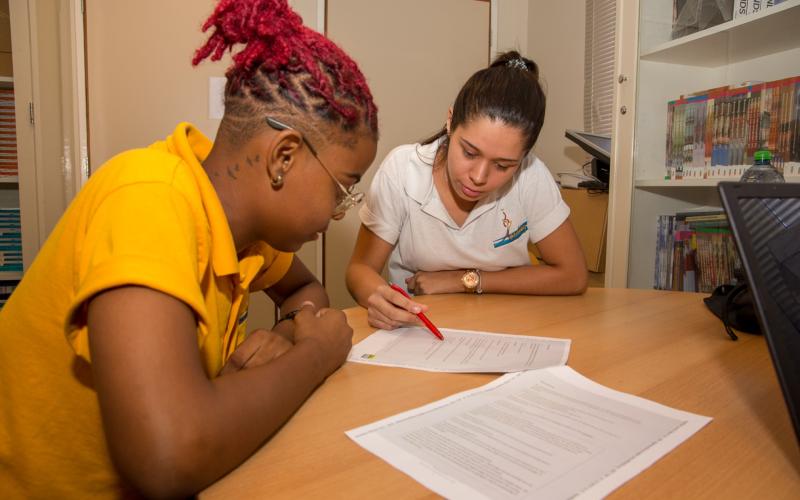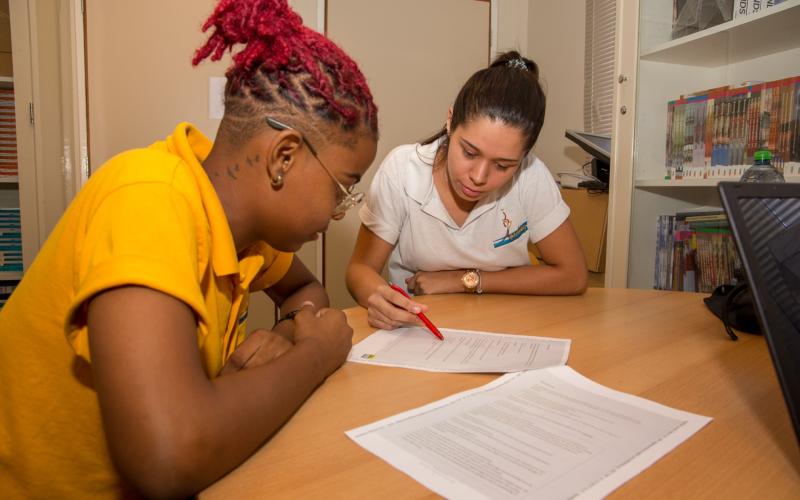
Every year, around 1,600 students from the Caribbean part of the Kingdom embark optimistically on a study programme in the Netherlands. But many fail to make it to the end. The National Ombudsman drew attention to this issue. He investigated the challenges faced by Caribbean students and made recommendations for government and other organisations. What has been done in response? What points of action need to be followed up on? This is the subject of this reconstruction.
Why an investigation into Caribbean students?
"Oh, you must be used to this. Serving white people, I mean. It’s the perfect job for you."
This is a comment made to Caribbean student Tays while she is working part-time in hospitality in Amsterdam alongside her studies. Tays can hardly believe her ears. Did her colleague really say that?
Problems piling up
Tays comes from Bonaire. Her experience is no exception. Many young Caribbean people studying in the Netherlands face racism.
But racism is not the only problem they have to tackle. Language issues, cultural differences, limited support and guidance, complex laws and regulations: the list goes on.
Healthcare allowance: am I entitled to it or not? Do I have to be working to qualify? It can be hard to find your way around all the various allowances. – Siddharta (24)
The result? Many young Caribbeans get behind in their studies or fail to complete their degrees in the Netherlands. Debts pile up as a result and psychological issues can arise.
Keeping up the pressure
These signals have been on the National Ombudsman’s radar for a while. From the students themselves, but also from Kompas For Students, the foundation where Deon Bisslik and Viviana Lopez Paz work. It is dedicated to providing guidance to Caribbean students in the Netherlands and helping them prepare in advance on the islands.
Deon: “In May 2017, we had already drawn the attention of the government and ministries to the problems faced by students. But it’s incredibly difficult finding structural solutions at that level. You really have to keep up the pressure.”
An investigation
When no changes are forthcoming, the National Ombudsman decides to embark on his own investigation. He is determined to find out what issues young Caribbeans actually face. And which relevant organisations can resolve the problems.
The Caribbean Netherlands: a quick reminder
The Kingdom of the Netherlands is made of four countries: The Netherlands, Aruba, Curaçao and Sint Maarten. Within the Netherlands, the islands of Bonaire, Sint Eustatius and Saba have a separate status (special municipalities). They are known as the Caribbean Netherlands. Together with Aruba, Curaçao and Sint Maarten, they make up the Caribbean part of the Kingdom.
The powers of the National Ombudsman apply to the Caribbean Netherlands only. Especially for this investigation, he chose to cooperate with his counterparts in Curaçao and Sint Maarten. In this long read, we have used the terms ‘Caribbean students’ and ‘young Caribbeans’ for the sake of brevity.
Approach and parties involved
A team of researchers sets to work. Annemarie Tuzgöl, project manager: “This issue involves an amazing number of players. We’ve brought them all together in order to gain an overall impression of the problems at play.”
To achieve this, the researchers introduce a series of initiatives:
- Via various different channels, a questionnaire is issued to Caribbean students who have studied (or are currently studying) in the Netherlands. Some 624 students complete the questionnaire.
- Focus group meetings are held with Caribbean students.
- The National Ombudsman’s researchers hold one-to-one interviews with students who study at a university of applied sciences and a lecturer.
- The researchers also talk to staff at the ministries, public bodies and organisations involved. These include the Ministry of Education, Culture & Science, DUO (the Education Executive Agency, which administers student grants and loans), the Social Insurance Bank (SVB), the National Office for Identity Data (RvIG), Het Arubahuis, Zorgverzekeringslijn (Health Insurance Information Line), Kences, Stichting DUWO, SSH Student Housing, WeConnect, Vereniging Levende Talen Papiaments (Papiamento Living Language Society), HvAnti, Stichting Studiefinanciering Curaçao (SSC), TuranGoeloe, Unified St. Maarten Connection (USC) and Stichting Kompas For Students.
- The researchers also attend webinars and study policy documents, parliamentary papers and reports.

Photo: Mick de Witte
Roundtable discussions
In November 2020, the National Ombudsman brings the study to a close with two roundtable discussions. Various organisations including student organisations, government bodies, and ombudsmen discuss the key findings. In the light of these discussions, the investigation team compiles a report that is presented in late 2020 and also translated into Papiamento and English.
Problems before, during and after studies
In the report, the National Ombudsman describes the main issues faced by Caribbean students:
1. Limited assistance available
Caribbean students receive only limited support or guidance in their choice of which subject to study. As a result, they have little awareness of what a study programme actually involves. This causes a relatively large number of first-year Caribbean students to switch courses in the first six months of their programme.
Back on the islands, we get our information from student counsellors who haven’t set foot in the Netherlands for thirty or forty years. (...). It’s only when you’ve actually started the course in the Netherlands that you have a chance to visit the open days. That’s when a lot of people discover that they’ve made entirely the wrong choice. – Viviana (29)
2. No Citizen Service Number
When they arrive in the Netherlands, Caribbean students do not yet have a Citizen Service Number (Burgerservicenummer). They can only obtain one after registration in the Key Register of Persons (Basisregistratie Personen, BRP). For that, they first need to have a residential address. But finding a student room is difficult because of shortages on the housing market.
Without a Citizen Service Number, students are unable to open bank accounts or take out insurance. Not all Caribbean students are aware of this in advance.
The Citizen Service Number was difficult to obtain because I was living with relatives and could not register at that address. Without one, I couldn’t organise other things such as a bank account or DigiD log-in code. – anonymous
3. Unfamiliar laws and regulations
Caribbean students are often unfamiliar with Dutch laws and regulations. They do not know exactly what their rights and obligations are when it comes to allowances and tax. They may also be unaware of the option to apply for municipal taxes to be waived. In addition, the students are not entitled to Dutch basic health insurance. This means that they are not eligible for a healthcare allowance.
I was told that you can apply to have municipal taxes and water rates waived if you are on a low income. When I applied, I was told by the municipality of The Hague that I had to apply for the healthcare allowance first, otherwise I wouldn’t qualify (...) But about two years later I received a letter from the Tax and Customs Administration demanding that I repay the allowance, because I wasn’t entitled to it. - anonymous

4. Culture shock
It can prove a real challenge for Caribbean students to acclimatise to Dutch culture and society. They can struggle with the language and face significant cultural differences. Alongside unfamiliar laws and rules, they also encounter discrimination. This can cause them to get behind with their studies and suffer psychological problems.
Some Dutch students don’t even know that Aruba and Bonaire are separate islands. They think everyone is from Curaçao, which means you must be lazy, a criminal, unpunctual and unreliable. – Karman (24)
5. Student debt
Many Caribbean students accumulate large amounts of student debt. In order to cope financially, they often have a local student loan in addition to their DUO loan. The lack of work means that they often struggle to repay the debt. The repayments regularly exceed students’ ability to pay.
Why is this? Salaries on the islands are lower, there is a different system of taxation and the cost of living on the islands is high. This can deter many former students from returning to the islands at all.
Returning to Aruba would be financial suicide. Of course, I have student loans to repay. That would be extremely difficult if I was living in Aruba. The minimum wage in Aruba is €856.46 compared to €1,680 in the Netherlands – Deon (31)
6. Exceptional status
The exceptional status of Caribbean students creates problems. Whereas some regulations regard Caribbean students as international students, others see them as ‘normal’ students. This can often be to the students’ disadvantage.
The Netherlands has organisations for refugees, senior citizens, patient groups – you name it. But there’s no helpdesk that we can contact for advice. – Milena (24)
Almost insurmountable problems
Some problems, such as housing market shortages or high levels of student debt affect all students in the Netherlands. However, such problems can be almost insurmountable for Caribbean students.
They feel abandoned, at university and in society as a whole. Combined with language difficulties and cultural differences, this can result in socio-cultural and psychological problems. In turn, this can cause students to fall behind or to discontinue their studies altogether. Students feel there is a lack of support and guidance. They sometimes feel like second-class citizens.
At the same time, government authorities and educational institutions actually assume that Caribbean students are self-reliant. In the view of the National Ombudsman, that is an illusion. In his opinion, the government should care for all its citizens. That includes this group of students. They are anything but second-class citizens.

Key recommendations
According to the National Ombudsman, the countries and authorities on both sides of the ocean need to collaborate with each other more and do so more effectively. His key recommendations are therefore:
- As part of the preparation process, ensure a comprehensive package of information is available for Caribbean students. Currently, the information is often fragmented.
- Ensure that Caribbean students already have a Citizen Service Number before arriving in the Netherlands. This will enable them to start arranging practical issues in advance.
- Offer Caribbean students access to Dutch basic health insurance and, with it, the right to the healthcare allowance.
- Provide students with information about tax (waivers) and allowances during their stay in the Netherlands.
- Provide access to psychological support. Tell Caribbean students about what is available from the outset and provide proactive support.
- Enable consolidated repayment of student loans. Currently, island loans extended to former students from Bonaire, Sint Eustatius and Saba are included in the repayments made to DUO, while those made to students from Curaçao, Aruba and Sint Maarten are not.
- Arrange an automatic means test on return. Currently, students returning to the Caribbean region must submit their own application to DUO to have the student loan repayment calculated. This should happen automatically.
Responses to the report
The report is published in December 2020. In the same month, several members of Parliament put parliamentary questions to the then Minister of Education, Culture and Science, Ingrid Van Engelshoven. She also discusses the report with the education ministers of Aruba, Curaçao and Sint Maarten in their regular consultation. The ministers acknowledge the problems and are determined to make concerted efforts to tackle them.
“The National Ombudsman's team really listened to us”, believes Deon Bisslik from Stichting Kompas For Students. “Much of what we told them has been included in the report. Finally, the real problems have been revealed.”
Institutes of higher education step up
In their joint consultation, the four education ministers decide to accept the offer made by the collaborating Dutch universities of applied sciences. They propose establishing a Steering Group to develop a plan of action aimed at ensuring that the education systems in the Netherlands and on the islands coordinate more effectively with each other.

Ron Bormans, chair of the Steering Group: “Ideally, we should be closely involved in the final stage of education on the islands in order to work on such issues as language proficiency and enable a proper discussion of the choice of course to study.”
The Minister’s response
In July 2021, the then Minister Van Engelshoven announces in a letter that the four education ministers are accepting the Steering Group’s proposal. She also asks its initiators to work on the proposals for improvements.
She is eager to stress that Caribbean students should be properly prepared for their arrival in the Netherlands. Many Caribbean students have no choice but to take advanced courses far away from home, simply because they are not available nearby.
She therefore calls for work on the following issues:
- Together with the education ministers of Aruba, Curaçao and Sint Maarten, she intends to investigate how students’ language proficiency can be improved.
- The Citizen Service Number must ultimately be introduced in the Caribbean Netherlands. The State Secretary for Interior Affairs and Kingdom Relations (BZK) sets to work on this.
- Information about debt waivers must be included in the package of information provided.
- Inhabitants of the Caribbean parts of the Kingdom must be able to make use of Dutch health insurance when studying in the Netherlands. With that in mind, the ministries of Health, Welfare and Sport (VWS) and Social Affairs and Employment (SZW) begin working on a draft bill.
- Van Engelshoven also has plans to investigate how Caribbean students can be encouraged to make use of existing support (including psychological support) and guidance.
- A student finance steering committee is set up to resolve the issues relating to the repayment of student debt.

In the second half of 2021, the Steering Committee will issue recommendations for improving the welcome and support received by Caribbean students, confirms Van Engelshoven in her letter of July 2021. In late 2021, she aims to reach further agreement on the approach to follow with the education ministers of Aruba, Curaçao and Sint Maarten. She expects to start seeing results from the approach in the academic year 2022-2023.
The new Minister for Education, Culture and Science, Robbert Dijkgraaf, recently told the Dutch Parliament that all Caribbean students who continue their studies in the Netherlands will be issued with citizen service numbers (BSN). This is in response to a motion brought on 17 February 2022 during a debate in the House of Representatives. The debate was about the bureaucratic obstacles that have a negative impact on the results achieved by students from the Caribbean part of the Kingdom.
The ombudsman pushes on
By this stage, the National Ombudsman has clearly identified the problems, together with other organisations. Van Engelshoven and the other education ministers have been convinced that the situation is a serious one.
In the meantime, the ombudsman also raises the issues with the education minister of Sint Maarten and the ombudsmen of Sint Maarten and Curaçao. He also provides a briefing on the report to the permanent parliamentary committee for Kingdom Relations and the permanent parliamentary committee for Education.
In 2021, National Ombudsman staff hold talks with the organisations, ministries and stakeholders involved. There are also consultations with the Vereniging Levende Talen Papiaments and the missions in The Hague representing Aruba, Curaçao and Sint Maarten.
Deon Bisslik, Stichting Kompas For Students: “I’m delighted by the dedication shown by the National Ombudsman. Thanks to him, we now have a report and media coverage of the problems faced by Caribbean students. The Ombudsman is remarkably persistent, ensuring that people’s attention remains on this subject.”

But, a year on from the report, have its recommendations already been implemented? And have Caribbean students noticed a difference?
In order to answer these questions, the National Ombudsman holds two roundtable discussions with stakeholders, former students, relevant ministries and the ombudsmen from the islands on 8 December 2021.
Improvements and points for attention
The result of the roundtable discussions is clear. Progress has been made in the right direction in order to resolve the problems faced by Caribbean students. But the end is not yet in sight.
What are the most important developments?
1. Better preparation for study in the Netherlands
In early 2022, the Steering Group issues a plan for a procedure aimed at improving coordination across education. It calls for a comprehensive support programme for Caribbean students, together with an overview of all parties involved. Finally, information aimed at Caribbean students must be provided to students and other parties more effectively.
Organisations step up
Several other organisations involved also step up and take action. TuranGoeloe, an organisation that provides guidance to foreign students in the Netherlands, runs an awareness-raising campaign for students on the islands. In December 2021, Stichting Studiefinanciering Curaçao (SSC) also issues a proposal to Aruba and Sint Maarten urging that school students on the islands be provided with better information about their potential arrival in the Netherlands at the end of their period at secondary school.
The Vereniging Levende Talen Papiaments also takes active measures to provide guidance to Caribbean students. Stichting Kompas For Students delivers some sterling work. They provide annual workshops in Aruba aimed at preparing students for their stay in the Netherlands as effectively as possible. They offer practical information about public transport through to tips on financial issues.

2. Legislative change on Citizen Service Number
In the meantime, the Ministry of BZK is working on legislative change. Its ultimate aim is to introduce the Citizen Service Number in the Caribbean Netherlands.
This change to the law is only of relevance to students from Bonaire, Sint Eustatius and Saba. For this reason, the Ministry explores the options for enabling students from Aruba, Curaçao and Sint Maarten also to obtain citizen service numbers.
3. Legislative change on health insurance
In addition, the Ministry of VWS is working with the Ministry of SZW on a second change to the law. They are exploring the extent to which students who have no access to Dutch public health insurance can still be eligible for it. This change to the law is expected to be passed in July 2022. With this in mind, they also start work on transitional arrangements.

4. Improvements on the repayment of student debt
DUO has made arrangements with the Tax and Customs Administration in the Caribbean Netherlands and Curaçao. For the years after the initial means-test request, they will proactively check students’ incomes. Any students failing to request a means test will be issued with reminders to apply for a means-test calculation.
In addition, DUO will proactively provide information on the islands about debt repayment. SSC will also advise students to borrow as little money as possible in order to prevent large debts.
In the future, DUO will need to take account of people’s actual living situation in the countries when determining the means-test calculation, according to the National Ombudsman. But that is all in the future. Before that, a student finance steering committee will be established, with representatives from the four countries. This group will focus on providing information and simplifying regulations.
The way forward
A range of different improvements have been set in motion. For the first time ever, an effective, integrated working relationship has been established by the Steering Group in order to take concerted action in tackling these problems in education. The National Ombudsman warmly welcomes that.
But there are still some points for attention. For example, Deon from Stichting Kompas For Students feels that specific action is lacking. “The various parties involved have lots of ideas”, he says. “But in the last year, nothing has really changed for the students. I would now really like to see the government getting properly involved. The government needs to make funding available and provide space to implement the solutions.”
Time-consuming process
Making changes to laws and regulations is also time-consuming, as project manager Annemarie knows all too well. “Dutch legislation is complex. A lot of it is also interrelated. But I would like to see the ministries take control and ensure that our recommendations are actually implemented.”
Besides, some of the organisations involved have concerns about the changes to the law. These seem to be primarily aimed at students from Bonaire, Sint Eustatius and Saba. This raises the risk of students from Aruba, Sint Maarten and Curaçao being treated differently. In addition, all of the regulations that students have to deal with are still extremely complex. The issue of accommodation is also not easily resolved.
Confidence in a successful outcome
In spite of everything, Deon from Stichting Kompas For Students still has confidence in a successful outcome. “It's the students themselves that give me hope. Students who announce that they’ve secured their degree with a smile on their faces. The fact that they’ve lived in the Netherlands, learnt a lot about themselves and developed in the process. That’s the most important thing. That’s what makes me continue my efforts every day.”
Annemarie: “It is clearly still too soon to give up on this. This is why the National Ombudsman is continuing to monitor the situation around Caribbean students.”
Feedback
In late 2022, the National Ombudsman will be organising another roundtable discussion. At it, he wants to hear about permanent changes for the students. He also plans to publish an interim report in the summer of 2022.
Annemarie: “We expect things to have improved by 2022. The problems have been investigated and clearly identified. It’s now a matter of doing something about it.”
Deon agrees. “We now have a new government. That offers new opportunities.”
Long read summary
In recent years, the National Ombudsman has been investigating the problems faced by Caribbean students in the Netherlands. Racism, language issues, cultural differences, limited support and guidance, complex laws and regulations: the list goes on. In response, the National Ombudsman made recommendations for government and organisations to improve the situation for Caribbean students.
Thanks to his efforts, the problems nationwide and on the islands have been identified. The first action points have also been set in motion. Dutch ministries are preparing changes to the law, ultimately enabling Caribbean students to obtain citizen service numbers and to access Dutch health insurance.
A Steering Group is also working on a procedure for improving coordination between Caribbean and Dutch education. The organisations involved are also working to improve the information provided about studying and living in the Netherlands. And about student debt.
But there is still a lot of work to be done. Making changes to laws takes time. Some problems, such as the lack of accommodation, cannot be resolved easily.
In the year ahead, the National Ombudsman will therefore continue to monitor progress on his recommendations. In late 2022, he is organising another roundtable discussion with organisations and ministries involved. At it, he expects to hear details of the permanent improvements achieved for Caribbean students in the Netherlands.
> Dit artikel is ook beschikbaar in het Nederlands
> E artíkulo aki ta disponibel na Papiamentu


